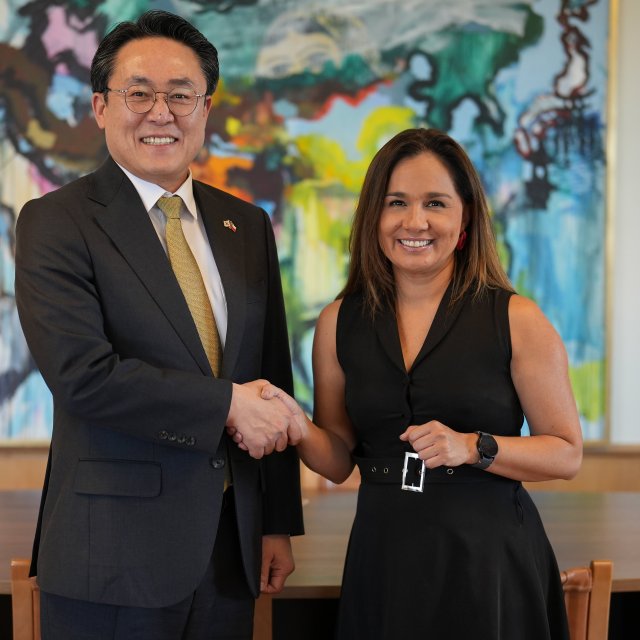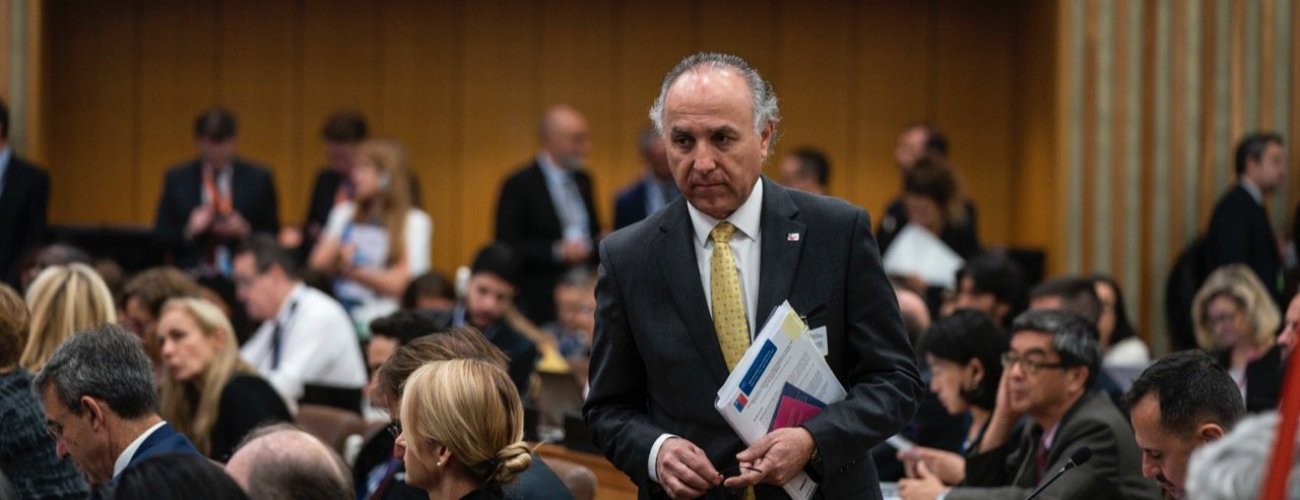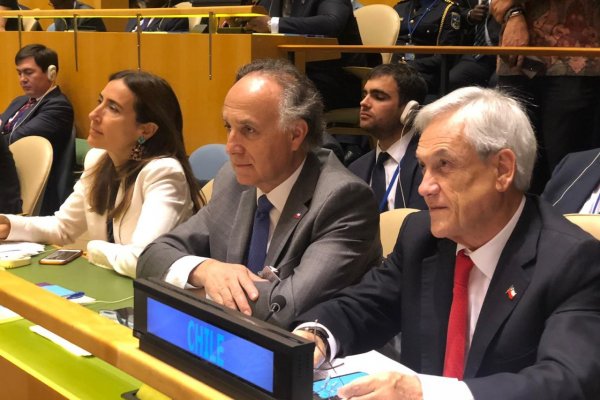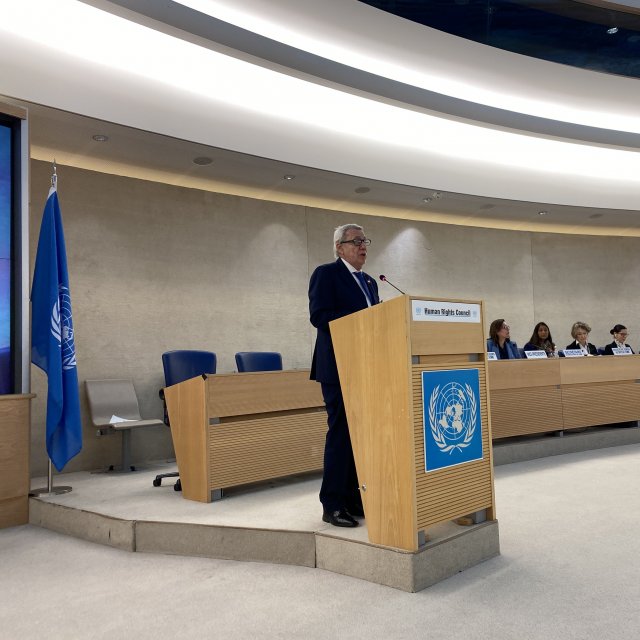 Thursday, February 27th 2025
Undersecretary meets with the Minister of Oceans and Fisheries of the Republic of Korea
Thursday, February 27th 2025
Undersecretary meets with the Minister of Oceans and Fisheries of the Republic of Korea
Chancellor Ribera: "We achieved the objectives we set ourselves as a country for this week"
Aligned with the three axes of his tour, the Foreign Minister held 21 bilateral meetings, eight high-level meetings, and participated in three events with foreign ministers and heads of state. Today, his participation in the 74th UN General Assembly ends with the Sixth Ministerial Meeting of the Pacific Alliance and the Association of Southeast Asian Nations.

"It was an excellent week for Chile and its diplomacy. We achieved the objectives we set ourselves as a country for this week, which we must now continue to consolidate. We have seen once again that the country enjoys great prestige in the international community, which entails enormous responsibilities," said Foreign Minister Teodoro Ribera at the close of his participation in the 74th General Assembly of the United Nations.
The tour lasted from September 21 to 28 and had, as its most relevant milestone, the speech of the President of the Republic, Sebastián Piñera, during the General Assembly, where the country sent a clear message to the world regarding the need to act against the effects of accelerating climate change.
The three axes from which the agenda was articulated were: environment and climate change; defense of democracy and human rights in the region; and promotion of free trade as an engine of development.

"In environmental matters, President Piñera's leadership has been evident and his recognition honors and prestiges Chile. Just as in 1987 in Montreal, when there was still no absolute scientific consensus, although very large, regarding the causes of the weakening of the ozone layer, the international community was able to agree on specific measures that three decades later show favorable results. The signal the President has given to the world is that now the scientific evidence is more than sufficient to act: that is one of the great values of the message that President Piñera delivered to the world," explained the Chancellor.
DEMOCRACY AND DDHH
In the axis of defense of democracy and human rights in the region, Minister Ribera explained that this may have been one of the most important weeks to reach consensus on Venezuela. "The resolution adopted in the framework of the session of the Consultative Body of the Inter-American Treaty on Human Rights; the joint declaration of the Lima Group with the International Contact Group; the common points of view found in the bilateral ones with Canada, Spain and Norway, among others, finally added to the resolution of the Human Rights Council in Geneva to initiate an investigation into the regime, demonstrate that the international isolation of Nicolás Maduro's dictatorship has reached a point of no return in order to force him to find a peaceful solution," he said.
The Chancellor also highlighted Chile's commitment to effective multilateralism focused on improving people's quality of life, expressed during the launch of the "Alliance for Multilateralism" Initiative, to which Chile was especially invited as a sponsor by Germany and France, countries that lead this initiative, in a context of confrontation between the great powers and a tendency to generate unilateral responses to global problems.
The Minister also pointed out that one of the high points in the tour was the signing of the text of the operating guidelines of the Forum for Progress in South America (PROSUR), a forum for dialogue and integration promoted by Chile and which brings together seven other countries: Argentina, Brazil, Colombia, Paraguay, Peru, Ecuador and Guyana, "with the aim of generating a modern system of regional integration, which will allow us to address the challenges we face in various fields, such as security, energy, prevention of natural disasters and others".
FREE TRADE
In the axis of promoting free trade as an engine of development, where the Minister of Foreign Affairs was accompanied by the Undersecretary of International Economic Relations, Rodrigo Yáñez, the global economic situation in a scenario of trade war and the need to defend together the institutionality that makes possible trade with clear rules, free and fair, was addressed. Within this context, alternatives were also analyzed to find new commercial opportunities and diversification of export destinations and attraction of investments.
"One of the strategic objectives of our trade policy is the diversification of exports and in this tour we have had the opportunity to agree important objectives with economies of relevance to Chile on its way to deepen our trade presence, in the countries of Southeast Asia and the Eurasian Economic Community, among others," said Undersecretary Rodrigo Yáñez.
In total, during his participation in the 74th United Nations General Assembly, Minister Ribera held 21 bilateral meetings, eight high-level meetings, participated in three events with foreign ministers and heads of state, aligned to the three axes of the tour that ran from 21 to 28 September. Today, their action ends with the Sixth Ministerial Meeting of the Pacific Alliance and the Association of Southeast Asian Nations.
Related articles
 Thursday, February 27th 2025
Undersecretary meets with the Minister of Oceans and Fisheries of the Republic of Korea
Thursday, February 27th 2025
Undersecretary meets with the Minister of Oceans and Fisheries of the Republic of Korea
 Monday, February 24th 2025
Minister van Klaveren reaffirms Chile's commitment to human rights and gender equality
Monday, February 24th 2025
Minister van Klaveren reaffirms Chile's commitment to human rights and gender equality









